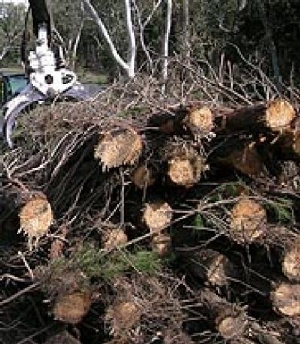Feb 4 2008
CSIRO and Monash University have developed a chemical process that turns green waste into a stable bio-crude oil.
 Forest waste can be converted into bio-crude oil.
Forest waste can be converted into bio-crude oil.
The bio-crude oil can be used to produce high value chemicals and biofuels, including both petrol and diesel replacement fuels.
"By making changes to the chemical process, we've been able to create a concentrated bio-crude which is much more stable than that achieved elsewhere in the world," says Dr Steven Loffler of CSIRO Forest Biosciences.
"This makes it practical and economical to produce bio-crude in local areas for transport to a central refinery, overcoming the high costs and greenhouse gas emissions otherwise involved in transporting bulky green wastes over long distances."
The process uses low value waste such as forest thinnings, crop residues, waste paper and garden waste, significant amounts of which are currently dumped in landfill or burned.
"By using waste, our Furafuel technology overcomes the food versus fuel debate which surrounds biofuels generated from grains, corn and sugar," says Dr Loffler.
"The project forms part of CSIRO's commitment to delivering cleaner energy and reducing greenhouse gas emissions by improving technologies for converting waste biomass to transport fuels."
The plant wastes being targeted for conversion into biofuels contain chemicals known as lignocellulose, which is increasingly favoured around the world as a raw material for the next generation of bio-ethanol.
Lignocellulose is both renewable and potentially greenhouse gas neutral. It is predominantly found in trees and is made up of cellulose; lignin, a natural plastic; and hemicellulose.
CSIRO and Monash University will apply to patent the chemical processes underpinning the conversion of green wastes to bio-crude oil once final laboratory trials are completed.